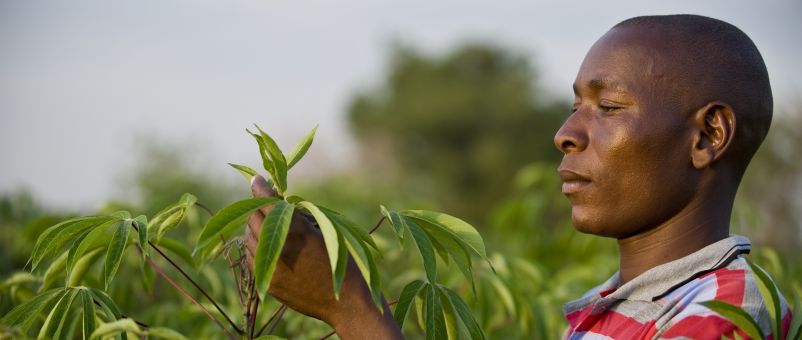- About
- Topics
- Story
- In-Depth
- Picks
- Opinion
- News
- Donate
- Signup for our newsletterOur Editors' Best Picks.Send
Read, Debate: Engage.
| September 19, 2018 | |
|---|---|
| topic: | Innovation |
| tags: | #Africa, #Startups, #blockchain |
| located: | Ghana, Nigeria, Kenya, Rwanda |
| by: | Bob Koigi |
Land remains one of the most treasured and emotive assets across the continent. With more than 80 per cent of all food produced in the continent coming from farmers who farm in small gardens, (often only a few square acres in size), and 70 per cent of the population earning a livelihood from agriculture, land is an essential commodity.
Yet over two-thirds of land in Africa is communally owned, meaning that the majority of the people have land but do not have official documents like title deeds to prove they are the legal owners. And as African countries rapidly urbanise and demand for housing grows, vanguard entrepreneurs have been pitching tents to buy land at cheaper rates and inflating the prices to prospective investors. This land craze has birthed a network of sophisticated cartels who dupe desperate buyers. “On average we handle five cases every week of land buyers who have enlisted the services of brokers to get them prime land especially in urban and semi-urban areas. Complaints range from getting fake title deeds to double registration of land. So serious is the situation that at times when the land buyers realise they have been duped, they commit suicide,” said Keith Mwanasi a property lawyer in Nairobi Kenya.
Humphrey Kitala, a banker, invested his savings in a prime land situated in the Thika area, some 45 kilometres from the capital. For half an acre he parted with $30,000 and hired a land-buying agency to manage the transaction. With a title deed that bequeathed him ownership, he now embarked on the next journey of getting a loan to start constructing his dream house. “But one month after going to check my land, I found it had been fenced-off and some makeshift structures had been erected. On confronting the dwellers, they claimed they had bought the land and produced title deeds. I was at a loss. I tried reaching the agency but they were nowhere to be found. I knew I had been duped”, he recalled. Upon visiting the lands registry at the Ministry of Lands his fears were confirmed that he had been given a fake title deed.
Humphrey’s problem is an example of what ails land transactions across Africa. Now a group of techies and ICT startups have decided to do something about it. As the blockchain wave sweeps the continent and becomes increasingly adopted by governments and key institutions, the new techpreneurs have moved beyond virtual currencies to find new uses of the technology, especially in land transactions. African governments have also enlisted the help of these techies to clean the mess in land registries.
The concept that is being modelled along successful application in countries like Georgia and Honduras include a fool-proof land titling system that stores information in immutable digital registries which is then verified by a network of computer users.
The idea, proponents of this technology argue, is to foster transparency and make land buying and acquisition as painless, cheap and safe as possible. “It is impressive to see this kind of technology solving one of the most pressing problems the continent has. If Africa can sort out its land acquisition problems then it automatically sorts out so many other bottlenecks. What we need to do now is to ensure that this is adopted across the board”, said Michael Odera from Kenya’s Ministry of ICT.
Land LayBy, a fintech startup has been working on a blockchain-powered land registry that seeks to restore sanity in Kenya’s real estate. The first of its kind innovation in East and Central Africa rewards those who enter the correct land entries in the blockchain with tokens dubbed ‘harambe’ tokens. Wrong entries will see one lose their tokens. The company sees itself complementing the Ministry of Land’s efforts at cleaning up the mess in land titling.
This, even as the government rolls out a database dubbed Single Source of Truth (SSOT), that it is betting on blockchain to streamline land transactions and clean out the numerous fake title deeds in circulation.
In Ghana where up to 80% of those who own land do not have the requisite documents, technology startups are now trying to reverse the sorry state of affairs. Bitland, one such startup is working with ordinary farmers who live on what is christened customary land, to register them online. In a country where documents like title deeds are used as collateral to obtain loans and other credit facilities, getting ordinary people to have legal ownership of their land is of utmost importance, the startup says. With a focus on rural areas, Bitland runs centres that are operated by solar-powered WIFI networks to ensure it registers as many people as possible. It looks to replicate this model in Nigeria and Kenya.
Rwanda has been a trailblazer, with a Blockchain and IOT Centre of Excellence it established in 2017 in partnership with WISekey, a Swiss cybersecurity firm cleaning up its land registry and connecting thousands of its citizens with tamper-proof and digitally stored land ownership documents.
By copying the embed code below, you agree to adhere to our republishing guidelines.

